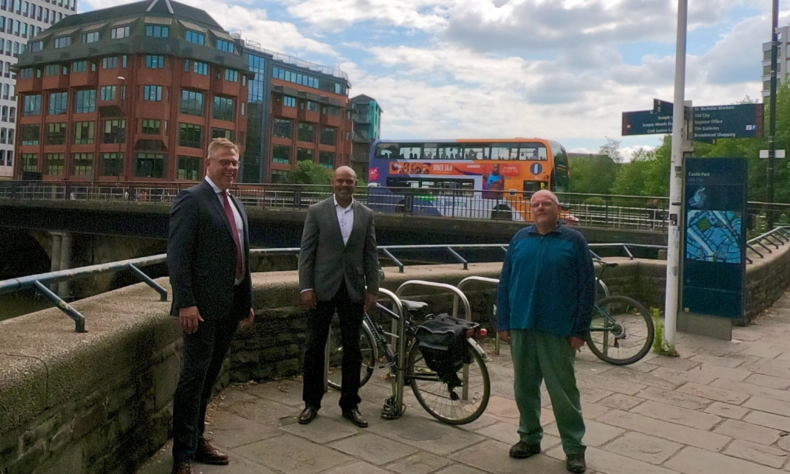Priority is being permanently given to buses, cyclists and pedestrians in the city centre after the Mayor of Bristol declared the trial closure of Bristol Bridge a success this week.
Bus lanes and enforcement cameras were installed on Bristol Bridge, Baldwin Street and Union Street last summer as part of work to improve air quality and make it easier for people to catch the bus, walk and cycle.
Motorbikes and taxis can also use Bristol Bridge, and other motorised vehicles can still access Baldwin Street and Union Street using other routes, but they can no longer use these streets to pass through the city centre to get elsewhere.
A new 2A bus service running parallel to the number 2 service was introduced immediately by First West of England as a result of the change, doubling the frequency of buses on this route. Since then bus punctuality and reliability has improved with traffic halved on the roads leading to Bristol Bridge and affected bus services up to five minutes faster.
Mayor Marvin Rees said:

The closure of Bristol Bridge is part of our bold vision to deliver clean air and transform travel in the city and I am delighted to make the change permanent after a successful trial. It has removed lots of polluting traffic from the central zone and improved bus punctuality and journey times, without causing significant problems elsewhere on the network.
By creating more space for public transport, we are paving the way for a mass transit system that will connect us all to jobs, leisure and each other. This decision takes us one step closer to a better, more inclusive future with cleaner air, safer and better public transport, and improved walking and cycling routes for everyone.
Doug Claringbold, Managing Director of First West of England, said:
When the pandemic struck it fundamentally changed people’s travel habits and presented a once in a lifetime opportunity to try and encourage the vital shift from normal car commuter patterns to more environmentally friendly and sustainable options.
The trial closure of Bristol Bridge to regular traffic was a move we warmly welcomed and I’m pleased to see Bristol City Council make this permanent with its announcement today.
Since the bridge was first closed last August we have closely monitored the situation and found that bus journey times on routes across Bristol Bridge have significantly improved and are up to five minutes quicker for the 1, 2 and Portway Park & Ride services. As a result, the frequency for the number 2 service has doubled after we were able to create a 2A service in response to the improvements.
As a company we are in complete alignment with Bristol City Council’s commitment to make our city centre a cleaner, greener and all round more pleasant and environmentally friendly place for everyone, and an efficient, more frequent public transport network is key to achieving that ambition.
In March this year, the Mayor also announced his vision for a mass transit public transport system in Bristol – one that can run separately to other traffic on both over and underground lines.
Part of this vision includes delivering rapid bus and cycle routes across the city, with Bristol Bridge serving as a central hub where different sustainable transport options meet.
Melanie Watson, co-chair of the One City Transport Board said:
Bus passengers consistently tell us that reliable services are one of key improvements they would like to see. By providing priority for buses at this key location and removing the congestion on a permanent basis, buses will now be able to travel freely and consistently offer reliable journey times for passengers.
Schemes such as these are vital to encourage passengers back to bus and helps to create a better environment for all.
The decision to make the Bristol Bridge bus lane permanent also applies to the camera enforced bus gates at either end of Baldwin Street, on St Augustine’s Parade, and at the bottom of Union Street.
Access to Baldwin Street and Union Street remains possible for loading, businesses, residents, disabled bays and car parks using alternative routes.
An additional six disabled bays have also been installed on High Street and Broad Street as part of pedestrianisation of the Old City, which was implemented last summer as another key part of clean air plans for the city centre.
Other transport upgrades delivered over the last year for cleaner air include the pedestrianisation of Cotham Hill and bike lanes on Lewins Mead, Park Row, Upper Maudlin Street and Marlborough Street. These measures are in place temporarily for the foreseeable future while permanent schemes are developed.
A traffic regulation order (TRO) is due to go live on Saturday, July 17, to make the changes implemented in the Bristol Bridge experimental scheme permanent.
More information, including maps detailing access to the area, is available at www.bristol.gov.uk/bristolbridgeinfo.
